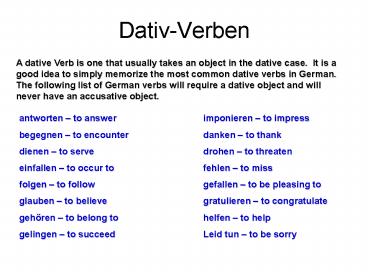Dativ-Verben - PowerPoint PPT Presentation
1 / 8
Title:
Dativ-Verben
Description:
Dativ-Verben A dative Verb is one that usually takes an object in the dative case. It is a good idea to simply memorize the most common dative verbs in German. – PowerPoint PPT presentation
Number of Views:856
Avg rating:3.0/5.0
Title: Dativ-Verben
1
Dativ-Verben
A dative Verb is one that usually takes an object
in the dative case. It is a good idea to simply
memorize the most common dative verbs in German.
The following list of German verbs will require a
dative object and will never have an accusative
object.
antworten to answer imponieren to
impress begegnen to encounter danken to
thank dienen to serve drohen to
threaten einfallen to occur to fehlen to
miss folgen to follow gefallen to be
pleasing to glauben to believe gratulieren
to congratulate gehören to belong to helfen
to help gelingen to succeed Leid tun to be
sorry
2
Nutzen to be useful to passen to
fit Passieren to happen to reichen to be
enough Schaden to damage schmecken to
taste Schwerfallen to be difficult
for vertrauen to trust Verzeihen
forgive wehtun to hurt Weidersprechen to
contradict zuhören to listen to
3
When using these verbs with pronouns, you must
always use the dative case.
You must use these
Nominative (Subjekt) Accusative (D.O.) Dative (I.O.)
Ich (I) mich (me) mir (me)
du (you informal) dich (you) dir (you)
er (he) ihn (him) ihm (him)
sie (she) sie (her) ihr (her)
es (it) es / ihn / sie (it) es/ihm/ihr (it)
wir (we) uns (us) uns (us)
ihr (yall) euch (yall) euch (yall)
Sie (You formal) Sie (You formal) Ihnen (You formal)
Sie (they) sie (them) ihnen (them)
4
Beispiele - Examples
Du fehlst mir! (I miss you.)
Was ist dir passiert? (What happened to you?)
Das schmeckt mir nicht gut. (That doesnt taste
good to me.)
Ich glaube dir. (I believe you.)
Das gehört mir. (That belongs to me.)
5
When using these verbs with definite articles,
then you must use the dative case articles.
You must use these
Nominative (Subjekt) Accusative (D.O.) Dative (I.O.)
der den dem
die die der
das das dem
die die den n
6
Beispiele - Examples
Ich habe dem Mann gratuliert. (I have
congratulated the man.)
Was ist dem Hund passiert? (What happened to the
dog?)
Du kannst der Frau nicht vertrauen. (You cant
trust that lady.)
Wir folgen dem Hund. (We are following the dog.)
Ich muss der Frau helfen. (I have to help the
lady.)
7
Likewise, when using these verbs with indefinite
articles, then you must use the dative case
articles.
You must use these
Nominative (Subjekt) Accusative (D.O.) Dative (I.O.)
ein (der word) einen einem
eine (die word) eine einer
ein (das word) ein einem
8
Beispiele - Examples
Das gehört einem Mann. (That belongs to a man.)
Was ist einem Hund passiert? (What happened to a
dog?)
Du kannst einem Mann nicht vertrauen. (You cant
trust a man.)
Wir folgen einem Hund. (We are following a dog.)
Ich muss einer Frau helfen. (I have to help a
lady.)

